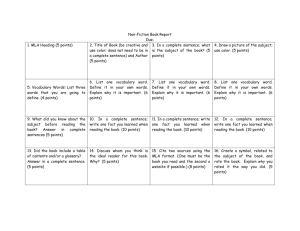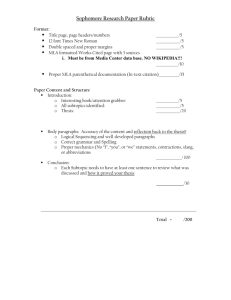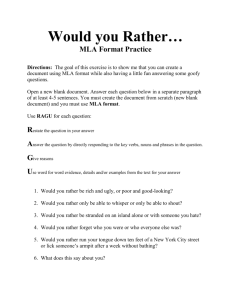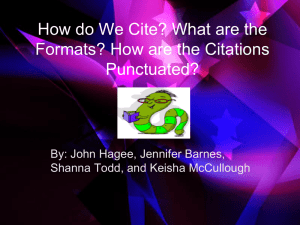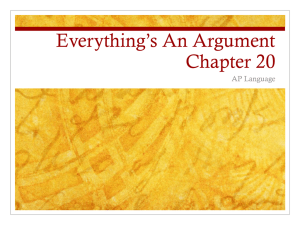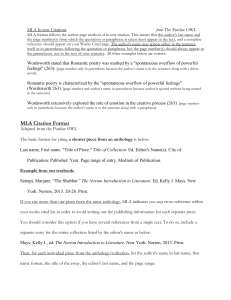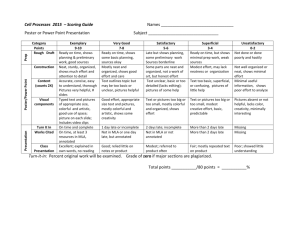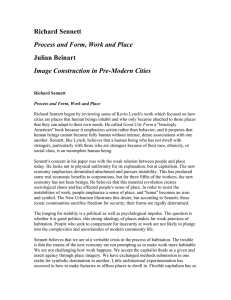research paper prompt - Anoka
advertisement
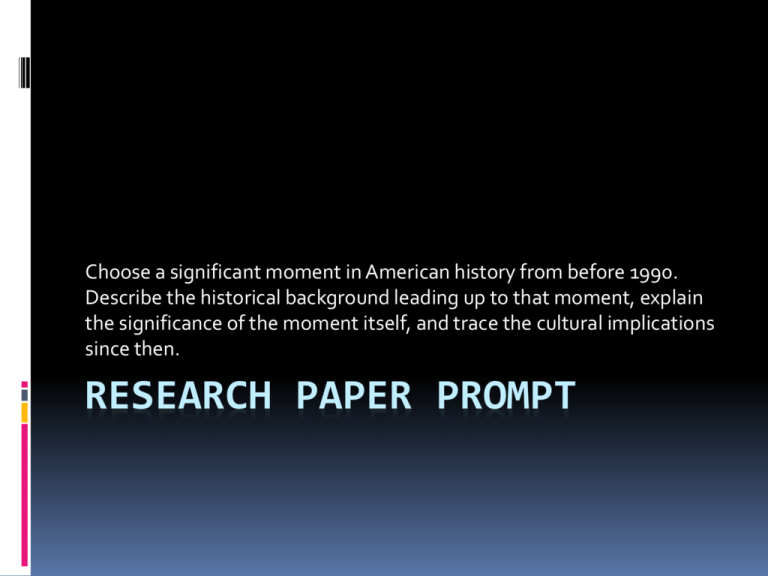
Choose a significant moment in American history from before 1990. Describe the historical background leading up to that moment, explain the significance of the moment itself, and trace the cultural implications since then. RESEARCH PAPER PROMPT Describe the historical background leading up to that moment List what events lead up to this moment How each event influenced the outcome Explain Explain the significance of the moment itself Why is it important? What did it impact? 5 W’s +H GIVE YOUR OWN IDEAS!!!!!! Trace the cultural implications since then How has the US changed because of this? List and explain IN YOUR OWN WORDS How to Research Electronic databases (Gale, ProQuest, eLibrary). Find 5 appropriate and supportive sources. At least 1 database/print Take notes – highlight, underline, summarize, and/or paraphrase (annotated bibliography). Annotated Bibliography At least five sources. List of sources and a short description (2-3 sentences) for each source. Helpful in keeping track of your sources and the information they contain. See example. Creating a Thesis Statement A thesis statement focuses on the causes, moments, and effects. The reader should have an idea what the rest of your paper is about. Narrow, not vague. Creating an Outline Create a chart to outline your thoughts. Direct quotations or paraphrased information (when available). Outline the structure of your paper. Must be annotated!!!! (Like we did with the persuasive speech tri A) Outline Example Intro Thesis statement Main points: A. B. C. Point A. Point B. Point C. Conclusion Summarize all ideas Conclude Anna Orlov Professor Willis English 101 3 March XXXX Online Monitoring: A Threat to Employee Privacy in the Wired Workplace: An Annotated Bibliography Adams, Scott. Dilbert and the Way of the Weasel. New York: Harper, 2002. Print. Adams’s “Dilbert” cartoons are known for satirizing everyday workplace issues. The cartoon on page 106 illustrates how rampant Internet use in the workplace has become and suggests that both employers and employees are well aware of the practice. The cartoon points out the difficulty employers face in trying to restrict employee Internet use. American Management Association and ePolicy Institute. “2005. Electronic Monitoring and Surveillance Survey.” American Management Association. Amer. Management Assn., 2005. Web. 15 Feb. 2006. According to the survey of workplace Internet use summarized in this article, employers are most concerned about employees visiting inappropriate Web sites. However, employers’ monitoring of employees extends beyond blocking certain Web sites. Many employers who participated in the study also track I individual keystrokes and review e-mails. The study suggests that the majority of employers who monitor Internet use are telling their employees that they MLA Formatting Double-space the text and use 12point font. In the upper left-hand corner of the first page, list your name, your instructor's name, the course, and the date. Again, be sure to use doublespaced text. Create a header in the upper right- hand corner that includes your last name, followed by a space with a page number. CITING Anything that DID NOT come out of your brain alone HAS TO BE CITED Anything you read in a book/website, etc. can be considered a quote-somebody else wrote it or said it Summarizing and paraphrasing NEED TO BE CITED In-Text Citation You need a works cited page, BUT You need to cite within the paper also Whenever you quote, paraphrase, summarize, or otherwise refer to the work of another, you are required to cite its source, either by way of parenthetical documentation or by means of a footnote. MLA in-text parenthetical citations The Modern Language Association (MLA) guidelines require that you cite the quotations, summaries, paraphrases, and other material used from sources within parentheses typically placed at the end of the sentence in which the quoted or paraphrased material appears. The parenthetical method replaces the use of citation footnotes. These in-text parenthetical citations correspond to the full bibliographic entries found in a list of references at the end of your paper. (Note that the titles of works are italicized, rather than underlined.) Unless otherwise indicated, on-line sources follow the same pattern as print versions. Single author named in parentheses. The tendency to come to terms with difficult experiences is referred to as a "purification process" whereby "threatening or painful dissonances are warded off to preserve intact a clear and articulated image of oneself and one’s place in the world" (Sennett 11). Single author named in a signal phrase. Social historian Richard Sennett names the tendency to come to terms with difficult experiences a "purification process" whereby "threatening or painful dissonances are warded off to preserve intact a clear and articulated image of oneself and one’s place in the world" (11). Two or more authors Certain literacy theorists have gone so far as to declare that "the most significant elements of human culture are undoubtedly channeled through words, and reside in the particular range of meanings and attitudes which members of any society attach to their verbal symbols" (Goody and Watt 323). Corporate author (organization, association, etc.). The federal government has funded research concerning consumer protection and consumer transactions with online pharmacies (Food and Drug Administration 125). Works with no author. Several critics of the concept of the transparent society ask if a large society would be able to handle the complete loss of privacy ("Surveillance Society" 115). Two or more works by the same author. In his investigation of social identity, The Uses of Disorder, Sennett defines adulthood as a stage where people "learn to tolerate painful ambiguity and uncertainty" (108). In a surprising move, Richard Sennett combines the idea of power with that of virtue: "the idea of strength is complex in ordinary life because of what might be called the element of its integrity" (Authority 19). Work found in an anthology or edited collection For an essay, short story, or other document included in an anthology or edited collection, use the name of the author of the work, not the editor of the anthology or collection, but use the page numbers from the anthology or collection. Lawrence Rosenfield analyzes the way in which New York’s Central Park held a socializing function for nineteenth-century residents similar to that of traditional republican civic oratory (222). Bible passage. Unfortunately, the president could not recall the truism that "Wisdom is a fountain to one who has it, but folly is the punishment of fools" (New Oxford Annotated Bible, Prov. 20-22). Secondary source of a quotation (someone quoted within the text of another author). As Erickson reminds us, the early psychoanalysts focused on a single objective: "introspective honesty in the service of self enlightenment" (qtd. in Weiland 42). Web page. Abraham Lincoln's birthplace was designated as a National Historical Site in 1959 (National Park Service). Note: Internet citations follow the style of printed works. Personal or corporate author and page number should be given if they exist on the website. Have more questions? For information on electronic sources, try the MLA's homepage or Online! A Reference Guide to Using Internet Sources. For citing government documents, see the University of Nevada's MLA Style Guide. If you have further questions, consult the current edition of the MLA Handbook for Writers of Research Papers, available at the reference desks at Perkins and Lilly Libraries.
